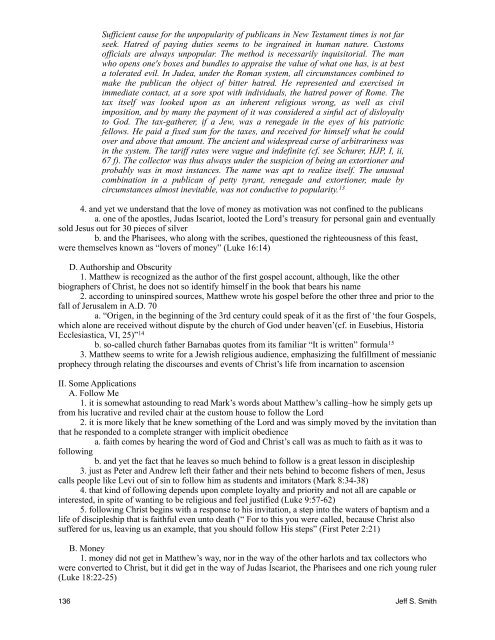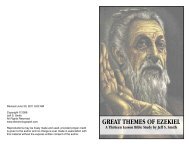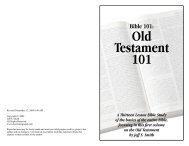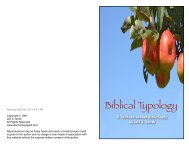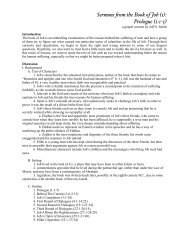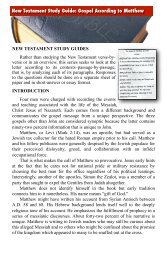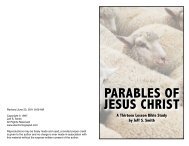Sufficient cause for the unpopularity of publicans in New Testament times is not farseek. Hatred of paying duties seems to be ingrained in human nature. Customsofficials are always unpopular. The method is necessarily inquisitorial. The manwho opens one's boxes and bundles to appraise the value of what one has, is at besta tolerated evil. In Judea, under the Roman system, all circumstances combined tomake the publican the object of bitter hatred. He represented and exercised inimmediate contact, at a sore spot with individuals, the hatred power of Rome. Thetax itself was looked upon as an inherent religious wrong, as well as civilimposition, and by many the payment of it was considered a sinful act of disloyaltyto God. The tax-gatherer, if a Jew, was a renegade in the eyes of his patrioticfellows. He paid a fixed sum for the taxes, and received for himself what he couldover and above that amount. The ancient and widespread curse of arbitrariness wasin the system. The tariff rates were vague and indefinite (cf. see Schurer, HJP, I, ii,67 f). The collector was thus always under the suspicion of being an extortioner andprobably was in most instances. The name was apt to realize itself. The unusualcombination in a publican of petty tyrant, renegade and extortioner, made bycircumstances almost inevitable, was not conductive to popularity. 134. and yet we understand that the love of money as motivation was not confined to the publicansa. one of the apostles, Judas Iscariot, looted the Lord’s treasury for personal gain and eventuallysold Jesus out for 30 pieces of silverb. and the Pharisees, who along with the scribes, questioned the righteousness of this feast,were themselves known as “lovers of money” (Luke 16:14)D. Authorship and Obscurity1. Matthew is recognized as the author of the first gospel account, although, like the otherbiographers of Christ, he does not so identify himself in the book that bears his name2. according to uninspired sources, Matthew wrote his gospel before the other three and prior to thefall of Jerusalem in A.D. 70a. “Origen, in the beginning of the 3rd century could speak of it as the first of ‘the four Gospels,which alone are received without dispute by the church of God under heaven’(cf. in Eusebius, HistoriaEcclesiastica, VI, 25)” 14b. so-called church father Barnabas quotes from its familiar “It is written” formula 153. Matthew seems to write for a Jewish religious audience, emphasizing the fulfillment of messianicprophecy through relating the discourses and events of Christ’s life from incarnation to ascensionII. Some ApplicationsA. Follow Me1. it is somewhat astounding to read Mark’s words about Matthew’s calling–how he simply gets upfrom his lucrative and reviled chair at the custom house to follow the Lord2. it is more likely that he knew something of the Lord and was simply moved by the invitation thanthat he responded to a complete stranger with implicit obediencea. faith comes by hearing the word of God and Christ’s call was as much to faith as it was tofollowingb. and yet the fact that he leaves so much behind to follow is a great lesson in discipleship3. just as Peter and Andrew left their father and their nets behind to become fishers of men, Jesuscalls people like Levi out of sin to follow him as students and imitators (Mark 8:34-38)4. that kind of following depends upon complete loyalty and priority and not all are capable orinterested, in spite of wanting to be religious and feel justified (Luke 9:57-62)5. following Christ begins with a response to his invitation, a step into the waters of baptism and alife of discipleship that is faithful even unto death (“ For to this you were called, because Christ alsosuffered for us, leaving us an example, that you should follow His steps” (First Peter 2:21)B. Money1. money did not get in Matthew’s way, nor in the way of the other harlots and tax collectors whowere converted to Christ, but it did get in the way of Judas Iscariot, the Pharisees and one rich young ruler(Luke 18:22-25)136! Jeff S. Smith
2. Jesus just never had the reverence for money that people harbor (Luke 16:13-15)3. when Matthew walked out of that tax office to become a collector of men, he committed himselfto honesty and spirituality, which denies money the power to be an idol in the heart4. but think about the Pharisees who object so strenuously to the Lord dining with greedy taxcollectors when they themselves were such lovers of moneya. could it be true that we as Christians publicly deride greed, selfishness and materialism, butare caught in its cords just the same?b. prioritizing wealth over worship, play over piety, saving over sharing, hoarding overhelping–those are the actions and attitudes of someone who is behaving hypocritically regarding moneyc. “So are the ways of everyone who is greedy for gain; It takes away the life of itsowners” (Proverbs 1:19).C. Disillusionment1. it might be surmised that Levi was a disillusioned Jew and it would be understandable if thatwere the casea. long before he lived, the sons of Eli, Hophni and Phinehas, disillusioned many worshipers bystealing sacrifices and laying with women in the tabernacle, so that, “men abhorred the offering of theLord” (First Samuel 2:17).b. by the time of Levi, the scribes, Pharisees, elders and chief priests were largely corrupted bytheir own indulgence and enrichment, so that it easy to see how people might become disillusioned withreligionc. Jesus had to go so far as to tell his disciples not to follow the example of the Phariseesbecause they did not practice what they preached (cf. Matthew 23)2. today, there is so much greed, deceit and scandalous sexual immorality among publicly religiouspeople and even ministers that disillusionment among the masses is easy to anticipatea. from the televangelist scandals of the 1980s to the pedophiliac Catholic priesthood exposedmore recently, from the deceptions of fake healers like Benny Hinn to the grifters like Robert Tiltonb. such people have brought shame on Christ and his faith3. it becomes even more important that we let our lights shine and behave as a city set on a hill,avoiding the damage done when we give the adversary opportunity to speak reproachfully (First Peter4:15-16)4. lest you yourself be discouraged and disillusioned, it is important to remember that even thefinest saints are but human and will err and be inconsistent at timesa. only Christ belongs on a pedestal; people will disappoint you if you give them enough timeb. but don’t give up your trust in Christ who will never leave you or forsake youc. people could have been disillusioned by the actions of Demas, Diotrephes, Hymenaeus, JohnMark, Peter and many others, but only the tempter wins then; disillusionment is not a defense onJudgment DayD. Obscurity1. we really learn nothing more about Matthew during the ministry of Christ until we see him listedwith the other apostles at the ascension and establishment of the church of Christ (cf. Acts 1:13)2. while Peter gains the initial spotlight, giving way to Paul in the second part of the Acts, Matthewand most of the others practically disappear from sight3. they labor in practical obscurity, where so much good and worthwhile work gets done4. Ronald Reagan displayed on his desk in the Oval Office a plaque which read, “There is no limitto what a man can do or where he can go if he doesn't mind who gets the credit.”a. there is room in the kingdom for the small things that you can do in practical obscurity,except that God sees them secretly and will reward them openly (cf. Matthew 6:1-5)b. it is only pride that compels us to announce our efforts and accomplishments so that wemight receive a congratulatory pat on the back and public acknowledgment5. be content to labor in obscurity, knowing that your reward is secure in a better placeConclusion<strong>Character</strong> <strong>Studies</strong>! 137
- Page 1:
CharacterStudiesby Jeff S. Smith
- Page 5:
Character StudiesThe goal of these
- Page 8 and 9:
2. she points backward to his defea
- Page 10 and 11:
2. Jesus knew he was not an oversiz
- Page 12 and 13:
6! Jeff S. Smith
- Page 14 and 15:
2. when the local church is involve
- Page 16 and 17:
10! Jeff S. Smith
- Page 18 and 19:
D. No Luther1. it fell to the apost
- Page 20 and 21:
14! Jeff S. Smith
- Page 22 and 23:
c. is the antithesis of Diotrephes
- Page 24 and 25:
2. and then he rebukes him for his
- Page 26 and 27:
20! Jeff S. Smith
- Page 28 and 29:
2. before gaining his victory over
- Page 30 and 31:
II. Practical ApplicationA. A Lesso
- Page 32 and 33:
a. we are all bending over so easil
- Page 34 and 35:
ConclusionJoseph was faithful to Go
- Page 36 and 37:
a. that, I think, is the great maje
- Page 38 and 39:
a. he had to leave his home, where
- Page 40 and 41:
34! Jeff S. Smith
- Page 42 and 43:
3. when Isaac became old and blind,
- Page 44 and 45:
II. Man’s New BeginningA. The Old
- Page 46 and 47:
1. every time the gospel is preache
- Page 48 and 49:
4. Elijah now has his turn, once th
- Page 50 and 51:
44! Jeff S. Smith
- Page 52 and 53:
a. we, like they, are strangers and
- Page 54 and 55:
D. Deliverer Appointed1. when God s
- Page 56 and 57:
50! Jeff S. Smith
- Page 58 and 59:
. those with little would be moved
- Page 60 and 61:
. in one fell swoop, he takes out a
- Page 62 and 63:
56! Jeff S. Smith
- Page 64 and 65:
3. it is not that some earn God's f
- Page 66 and 67:
60! Jeff S. Smith
- Page 68 and 69:
C. The Pleasures of Sin Are Passing
- Page 70 and 71:
64! Jeff S. Smith
- Page 72 and 73:
3. reaching our land of milk and ho
- Page 74 and 75:
68! Jeff S. Smith
- Page 76 and 77:
1. he believed, but he was not yet
- Page 78 and 79:
72! Jeff S. Smith
- Page 80 and 81:
1. we must know the Bible and be ab
- Page 82 and 83:
76! Jeff S. Smith
- Page 84 and 85:
2. David took care to respect the p
- Page 86 and 87:
a. if he complains about having to
- Page 88 and 89:
. later in life, we see Herod Antip
- Page 90 and 91:
84! Jeff S. Smith
- Page 92 and 93: 2. this Aaronic priesthood executed
- Page 94 and 95: 88! Jeff S. Smith
- Page 96 and 97: 4. that more acute, more spiritual,
- Page 98 and 99: D. His Defense (cf. Acts 7:1-50)1.
- Page 100 and 101: 94! Jeff S. Smith
- Page 102 and 103: A. Concern For Others, Even Servant
- Page 104 and 105: 98! Jeff S. Smith
- Page 106 and 107: II. Some ApplicationsA. Their Chara
- Page 108 and 109: 102! Jeff S. Smith
- Page 110 and 111: 8. afterward, Pilate permitted Jose
- Page 112 and 113: 106! Jeff S. Smith
- Page 114 and 115: D. A Student1. the eunuch is in fac
- Page 116 and 117: 110! Jeff S. Smith
- Page 118 and 119: a. it was no more a blessing to dwe
- Page 120 and 121: 114! Jeff S. Smith
- Page 122 and 123: D. His Palace1. Nebuchadnezzar’s
- Page 124 and 125: 118! Jeff S. Smith
- Page 126 and 127: language, creating different tongue
- Page 128 and 129: 122! Jeff S. Smith
- Page 130 and 131: 4. Naomi returns in deep bitterness
- Page 132 and 133: 126! Jeff S. Smith
- Page 134 and 135: . it is not hard to imagine that th
- Page 136 and 137: 130! Jeff S. Smith
- Page 138 and 139: C. Pointing at The Antichrist1. a f
- Page 140 and 141: 134! Jeff S. Smith
- Page 144 and 145: 138! Jeff S. Smith
- Page 146 and 147: 2. and so the wisdom of the magi wa
- Page 148 and 149: 142! Jeff S. Smith
- Page 150 and 151: courier it to Paul and it became to
- Page 152 and 153: 146! Jeff S. Smith
- Page 154 and 155: illions of souls from benefiting is
- Page 156 and 157: 150! Jeff S. Smith
- Page 158 and 159: 17:15-21)2. the birth was announced
- Page 160 and 161: 154! Jeff S. Smith
- Page 162 and 163: . Thomas insisted that he would onl
- Page 164 and 165: 158! Jeff S. Smith
- Page 166 and 167: 2. first, he becomes the epitome of
- Page 168 and 169: 162! Jeff S. Smith
- Page 170 and 171: esteem, wondering what we will do w
- Page 172 and 173: 166! Jeff S. Smith
- Page 174 and 175: its soothing aroma and pain-relievi
- Page 176 and 177: 170! Jeff S. Smith
- Page 178 and 179: 3. this is the last that we hear of
- Page 180 and 181: 174! Jeff S. Smith
- Page 182 and 183: and both began to return once he wa
- Page 184 and 185: 178! Jeff S. Smith
- Page 186 and 187: led to the execution of innocent Na
- Page 188 and 189: 182! Jeff S. Smith
- Page 190 and 191: government or of an occupying power
- Page 192 and 193:
186
- Page 194 and 195:
to cooperate with her scheme; how c
- Page 196 and 197:
190
- Page 198 and 199:
1. literal slavery like the kind th
- Page 200 and 201:
3. when Lot chose to live in Sodom,
- Page 202 and 203:
196
- Page 204 and 205:
Christ3. they have the mission to t
- Page 206 and 207:
200
- Page 208 and 209:
a. he is frequently described as a
- Page 210 and 211:
204
- Page 212 and 213:
II. Some ApplicationsA. Prodigies a
- Page 214 and 215:
a. the other bureaucrats turned him
- Page 216 and 217:
21:20-25)a. it is safe to say that
- Page 218 and 219:
212
- Page 220 and 221:
Ittai)b. as much as he hated what h
- Page 222 and 223:
216
- Page 224 and 225:
II. Some ApplicationsA. Decisive Th
- Page 226 and 227:
or friendship at all (First John 3:
- Page 228 and 229:
c. Antipas was part of the tennis m
- Page 230 and 231:
224
- Page 232 and 233:
3. Silas begins and ends his Bible
- Page 234 and 235:
26Brown, Driver, Briggs and Geseniu


